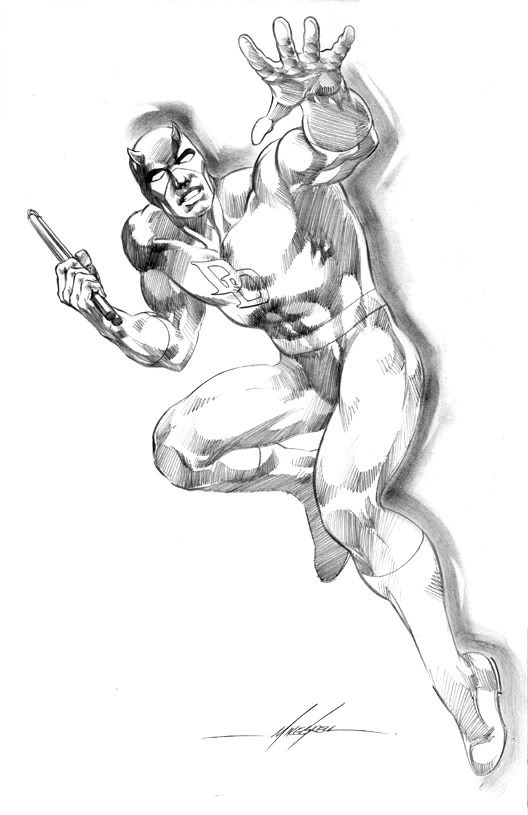
I ran two comic shops over eight years time, so I can point to any number of examples in my personal history of disgruntled fanboy syndrome. If you're reading this, you've probably suffered from it to some degree yourself at various times. As an example, I give you "Clint." There were lost of reasons to take jabs at Clint, as he still worked a McJob and lived with his parents at an age when he should have been many years deep into building his own home. Clint loved lots of comic book characters, and visited my shop very regularly, but bought very few comics. He would go on and on about how much better they were decades prior, and how no one ever got them right anymore. He particularly loathed Frank Miller, who he even then credibly blamed for destroying the Batman, but more incredulously, also felt the same about his work on Daredevil. I'd never met anyone who hated Miller on Daredevil, and for the most part knew hardly anyone who bothered to even read the character before Miller. Before the 80's, DD was basically just a lukewarm Spider-Man knockoff with a few minor adjustments, so who cared about that guy until he was recast as a pulp detective in long underwear, Dashielle Hammett by way of Don McGregor?
That's where things get sticky. No matter how many people adore Miller's groundbreaking work on Matt Murdock and related characters across two decades, the fact remains someone kept Daredevil's book in print for nearly as long before Miller ever laid a finger on him. It isn't just that Daredevil had a lengthy history of outstanding artists and some fine stories to his credit-- the character continously sustained an audience through some of the lowest periods of comic book publishing history of enough size as to never be cancelled until well after Miller said his final goodbye to the concept. That being the case, how can you not acknowledge the work that came before Miller, and who can dismiss the grievances of fans who felt Miller betrayed the qualities that endeared them to the character in the first place?
On the other hand, people who hate Miller for his Daredevil run, then and now, seem to be in a fairly dismal minority. If you work in a field where by and large a corporation owns and is legally considered the creator of the characters they publish, it could be argued that serving the publisher's demands is equivalent to doing the creation due justice. I for one have never had much sympathy for creators like Steve Gerber and Marv Wolfman, who intentionally withheld signing away their creations as works made for hire. Knowing full well they were incorporating them into a publisher-owned universe of characters with the intent of exploiting their commercial prowess only to withdraw said characters after they achieved popularity seems to me to be a matter not of creator's rights but of bad faith. However, for most of comics' history, their creators have not enjoyed the option of retaining any ownership or management of their creations, and it seems to me it is also an act of bad faith for publishers to utterly exhaust their talent, strip mine their efforts, and turn out the husks of their ideas into other hands to molest however they need to in order to restore commercial viability. Creators may not be legally recognized as such under works made for hire, but they willingly bestow a small measure of their hearts and souls into their concepts, and it strikes me as immoral to abandon any responsibility to upholding the creative integrity of that gift.
Now, comic book publishers are not the Amish, so they will not freeze a character in amber for all eternity to nurture a feeling of security in fanboys. Characters have to grow and change not just to remain viable from a sales standpoint, but also to remain relevant to shifting culture over the great expanse of time. The reason why every modern comic book creator doesn't just retain majority rights to all their works is because writing a character like Batman assures them a measure of immortality. Super-heroes are the American mythology, passed down through the generations to be both glorified and modified to maintain their power over the imaginations and inclinations of mankind. They are our role models and emotional escapes. We love them and wish to commune with them as either revelors or prophets. In the 1980's, Daredevil was barely limping by as a hall closet in the House of Ideas. Frank Miller renovated around the character, and in the end added on a whole room around that small space. You may miss the comfortable nook that was, but in his wake Daredevil became unforgettable and indispensable. Again though, Miller expanded from an existing space into a more substantial quarters. While he took Matt Murdock to some dark places that forever removed his from his earlier, lighthearted leanings, the core of the character's concept and subsequent development allowed for Miller's new path. In other words, this remodel was structurally sound, aside from the occasional creek out of the Clints of fandom.


No comments:
Post a Comment